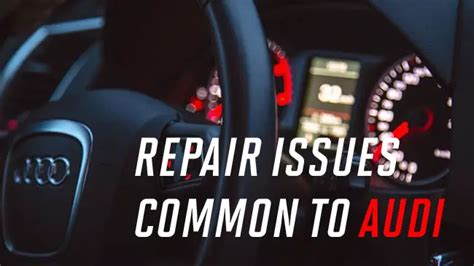Owning an Audi is often synonymous with luxury and performance, but like any vehicle, it can experience its share of issues. In this comprehensive guide, we delve into the common known problems that Audi owners might encounter, shedding light on their root causes and offering practical solutions. From understanding the intricacies of your vehicle to identifying potential issues early, we’ll provide essential maintenance tips to help you avoid costly repairs down the road. Moreover, we’ll explore user experiences and real-life stories to lend context to these challenges, ensuring you’re well-equipped to tackle any Audi-related hurdles. Whether you’re a seasoned Audi enthusiast or a new owner, this article will serve as your go-to resource for maintaining the reliability and performance of your prized vehicle. Dive in to discover how to keep your Audi running smoothly for years to come!
Overview Of Common Audi Known Issues
When it comes to Audi known issues, understanding the most prevalent problems can help owners make informed decisions, especially regarding maintenance and repairs. Below is an overview of some common issues faced by Audi models:
| Issue | Symptoms | Common Models Affected |
|---|---|---|
| Oil Consumption | Frequent oil top-ups, warning lights | Audi A4, A5, Q5 |
| Electrical Issues | Dashboard malfunctions, battery drain | Audi A6, A7, A8 |
| Timing Chain Tensioner Failure | Engine noise, poor performance | Audi Q7, A8 |
| Turbocharger Problems | Loss of power, unusual noises | Audi A4, A5, Q5, Q7 |
| Cooling System Failures | Overheating, coolant leaks | Audi A3, A4, A6 |
By recognizing these Audi known issues, owners can take appropriate steps to address them promptly and maintain their vehicle’s performance. Regular diagnostics and preventative maintenance are key in mitigating these common problems.
Understanding The Root Causes Of Audi Issues
When it comes to Audi known issues, understanding the root causes is crucial for effective troubleshooting and prevention. Several factors contribute to these problems, often stemming from design, manufacturing, or maintenance practices. Below are some common root causes:
| Root Cause | Description |
|---|---|
| Design Flaws | Some Audi models may exhibit design weaknesses that lead to recurring issues, such as poor electrical connections or insufficient cooling systems. |
| Manufacturing Defects | Occasionally, manufacturing processes can introduce defects in components, resulting in premature failures. This could be due to subpar materials or assembly errors. |
| Lack of Maintenance | Neglecting regular maintenance can exacerbate existing problems. Failing to adhere to recommended service intervals can result in issues such as oil sludge build-up or worn-out brake components. |
| Environmental Factors | Environmental conditions, such as extreme temperatures or humidity, can impact the performance of specific components and systems, leading to potential malfunctions. |
| Driving Habits | Poor driving habits or aggressive maneuvers can contribute to wear and tear on vehicles, exacerbating common Audi known issues over time. |
By recognizing these root causes, Audi owners can better address and mitigate problems. Keeping an eye on these factors not only aids in the timely identification of issues but also contributes to the longevity and reliability of the vehicle.
How To Identify Common Audi Problems
Identifying common Audi problems early can save you time and money on repairs. Here are some key signs to look for that may indicate you are facing Audi known issues:
1. Warning Lights: Pay attention to the dashboard warning lights. A check engine light, oil pressure warning, or other indicator lights can signal underlying issues that require immediate attention.
2. Unusual Noises: Listen for any new sounds such as grinding, knocking, or hissing. These noises can signify issues with components like brakes, engine, or transmission.
3. Fluid Leaks: Check for any fluids underneath your vehicle. Leaks can indicate serious problems, such as coolant or oil leaks, which are common among Audi known issues.
4. Performance Issues: Notice any changes in performance, such as reduced horsepower, poor acceleration, or a stalling engine. These could be signs of fuel system issues or other mechanical problems.
5. Electrical Malfunctions: Issues with the electrical system can manifest in problems with power windows, central locking, or dashboard gauges not functioning properly.
6. Unpleasant Odors: Unusual smells, such as burning rubber or oil, can be a strong indicator of a problem that needs immediate attention.
7. Tire Wear: Check your tire wear patterns. Uneven tire wear can suggest alignment issues or problems with suspension components.
Table of Common Audi Problems and Symptoms
| Problem | Symptoms |
|---|---|
| Engine Overheating | Temperature gauge is high, steam from the hood |
| Transmission Slippage | Delayed engagement, poor acceleration |
| Brake Issues | Squeaking noises, reduced stopping power |
| Battery Problems | Dim lights, difficulty starting the engine |
By monitoring these signs and symptoms, you can quickly identify Audi known issues and take appropriate action, whether it’s consulting with a mechanic or delving deeper into DIY repairs.
Impact Of Audi Known Issues On Performance
Understanding how Audi known issues affect vehicle performance is crucial for any Audi owner. These issues can significantly influence various aspects of your car’s functionality, including power delivery, handling, and overall driving experience.
For instance, engine-related problems such as oil leaks or ignition coil failures can lead to reduced power output and engine misfires, making acceleration sluggish. If left unaddressed, these mechanical failures can also contribute to more severe engine damage.
Similarly, transmission issues can hinder smooth gear shifting, causing delays or jarring transitions that disrupt ride comfort and driving efficiency. This not only affects how the vehicle performs but can also lead to increased wear and tear on other components.
Additionally, electrical problems often manifest through warning lights on the dashboard, which may indicate underlying issues that can affect the performance of key systems like braking and steering. Inconsistent performance can detract from the driving satisfaction that Audi vehicles are known for.
Moreover, neglecting to address these Audi known issues may result in decreased fuel efficiency, as the engine works harder to compensate for inefficiencies. Such a situation can lead to higher operational costs over time.
Addressing Audi known issues promptly is vital to maintain performance, safeguard your vehicle’s longevity, and enhance the overall driving experience. Regular maintenance checks can help identify potential problems before they escalate, ensuring that your Audi operates at its best.
Essential Maintenance Tips To Avoid Audi Issues
Keeping your Audi in top shape is key to preventing the Audi known issues that many owners experience. Adhering to a regular maintenance schedule can mitigate potential troubles down the road. Here are some essential tips:
| Maintenance Task | Frequency | Benefits |
|---|---|---|
| Oil Change | Every 5,000 to 10,000 miles | Ensures engine lubrication, improves performance |
| Tire Rotation | Every 6,000 to 8,000 miles | Promotes even tire wear and extends tire life |
| Brake Inspection | Every 10,000 miles | Enhances safety and prevents costly repairs |
| Fluid Checks | Every 3,000 miles | Identifies leaks and maintains system functions |
| Air Filter Replacement | Every 15,000 to 30,000 miles | Improves air quality and engine efficiency |
Additionally, make sure to use high-quality parts and fluids that are recommended for your specific Audi model. Keeping a maintenance log can also help you track your services and catch any recurring issues early. Following these guidelines will significantly reduce the likelihood of encountering Audi known issues and ensure a smoother driving experience.
Common Audi Known Issues And Their Fixes
Audi known issues can impact the driving experience and overall vehicle performance. Here, we will explore several frequent problems faced by Audi drivers and how to effectively resolve them.
1. Oil Consumption Problems
Many Audi models suffer from excessive oil consumption. This usually results from faulty piston rings or valve seals. To fix this issue, consider replacing the affected parts. Regularly check your oil levels and top off as needed while also ensuring you use the recommended oil type.
2. Electrical System Faults
Electrical issues, such as dashboard warning lights and malfunctioning infotainment systems, can plague Audi vehicles. Troubleshooting these problems typically involves checking fuses and wiring. For persistent issues, a comprehensive diagnostic scan may reveal deeper problems that need professional attention.
3. Timing Belt Failures
Timing belt failures can lead to severe engine damage. It’s important to replace the timing belt according to the manufacturer’s maintenance schedule, typically every 60,000 to 100,000 miles. If you’ve missed this replacement, be vigilant for any unusual noises coming from the engine.
4. Transmission Problems
Some Audi models may experience rough shifting or slipping in the transmission. Check for low transmission fluid levels or contamination. Regular fluid changes can help mitigate these issues. If problems persist, consider seeking out a transmission specialist for a detailed inspection and possible repairs.
5. Suspension Wear
Suspension components can wear over time, leading to a bumpy ride or poor handling. Signs of wear include unusual noises or uneven tire wear. Inspect struts and shocks, and replace them as necessary to restore vehicle comfort and safety.
6. Fuel Pump Failure
Fuel pump issues can cause starting problems or engine stalling. If you hear whining noises from the fuel tank, it may be time to replace the fuel pump. Regular fuel filter changes can also help maintain the fuel system’s longevity.
7. Brake System Issues
Common brake issues include squeaking or grinding noises and a soft brake pedal. Regularly inspect brake pads and rotors for wear. If these components are excessively worn, replace them promptly to ensure safety on the road.
8. HVAC System Problems
Heating, ventilation, and air conditioning (HVAC) problems can often be traced back to a faulty compressor or blocked cabin filters. Maintain your HVAC system by replacing cabin air filters regularly and consulting a technician if you notice any significant drops in heating or cooling efficiency.
Addressing these Audi known issues early on can help prevent more severe problems down the line. Always refer to your user manual for specific recommendations and consult with a certified mechanic for complex repairs.
Upgrading Parts To Prevent Audi Known Problems
Upgrading your Audi with high-quality aftermarket or OEM parts can significantly reduce the likelihood of encountering Audi known issues. Here are some key areas to consider when upgrading components to enhance your vehicle’s reliability and performance:
1. Suspension System: Upgrading the suspension with performance shocks and struts can improve handling and ride quality, reducing wear and tear on other components.
2. Braking System: Consider upgrading to high-performance brake pads and rotors. This not only enhances braking efficiency but also prolongs the lifespan of the braking system, minimizing the risk of known braking issues.
3. Electrical Components: Replacing old or worn electrical connectors and wiring can eliminate electrical problems that are common in older Audi models. Look for high-quality replacements that offer better durability.
4. Engine Parts: Upgrading to performance air filters, exhaust systems, and tuning chips can enhance engine performance while also helping to prevent issues related to engine efficiency and longevity.
5. Cooling System: Installing a high-performance radiator or better coolant can help in maintaining optimal temperatures, reducing the risk of overheating—which is a common concern in many Audis.
6. Tires: High-quality tires provide better traction and handling, significantly reducing the chances of issues related to wear and performance.
Investing in quality upgrades not only enhances your Audi’s performance but also ensures that your vehicle is less prone to facing Audi known issues. Regularly upgrading and maintaining these critical components can keep your Audi running smoothly for years to come.
Cost-Effective Solutions For Audi Repair
When dealing with Audi known issues, a common concern for many owners is finding cost-effective repair solutions. Here are some practical strategies to help you manage repairs without breaking the bank:
By taking these steps, you can maintain your Audi’s performance while keeping repair costs manageable. Staying informed and proactive can help mitigate the impact of Audi known issues, ensuring a smoother ownership experience.
User Experiences: Real Stories About Audi Issues
Real-life experiences from Audi owners can provide valuable insights into the Audi known issues that might not be highlighted in service manuals. Here are a few notable stories from Audi enthusiasts and drivers:
| Owner | Model | Issue Faced | Resolution |
|---|---|---|---|
| John D. | Audi A4 | Engine Misfiring | Replaced the ignition coils and spark plugs, resolved the problem. |
| Sarah K. | Audi Q5 | Transmission Slipping | Software update at dealership, improved shifting responsiveness. |
| Mike L. | Audi A6 | Electrical Problems | Replaced the battery and alternator, no more issues. |
| Ella H. | Audi TT | Oil Consumption | Performed a piston ring replacement. Fixed excessive burning. |
These stories reflect a variety of Audi known issues that owners have encountered, ranging from minor inconveniences to significant repairs. Engaging with fellow Audi owners through online forums and social media can also shed light on solutions and preventive measures that may not be immediately apparent.
By sharing these experiences, Audi users can help each other navigate the challenges associated with Audi known issues. Whether through direct fixes or preventive care, the shared knowledge enhances the ownership experience and preserves the reliability of these luxurious vehicles.
Preventive Measures For Long-Term Audi Reliability
To ensure the long-term reliability of your Audi and reduce the risk of encountering common Audi known issues, implementing preventive measures is essential. Here are several effective strategies to help maintain your vehicle’s performance:
- Regular Maintenance: Adhere to the manufacturer’s recommended maintenance schedule. Routine checks and services can identify minor issues before they escalate into major problems.
- Quality Parts: Use OEM (Original Equipment Manufacturer) parts when replacing components. High-quality parts can enhance performance and longevity while minimizing the risk of complications associated with inferior products.
- Inspection of Fluid Levels: Regularly check and top off engine oil, coolant, brake fluid, and transmission fluid. Proper fluid levels are critical for the smooth operation of your Audi.
- Tire Care: Keep your tires properly inflated and aligned. Regular rotation and balance can improve fuel efficiency and prolong tire life, reducing strain on other vehicle systems.
- Diagnostic Checks: Utilize diagnostic tools to regularly scan your vehicle for error codes. Early detection of faults can provide insights into potential Audi known issues, allowing for timely interventions.
- Driving Habits: Practice smooth driving habits. Abrupt acceleration and hard braking can strain your engine and transmission, leading to wear and tear over time.
- Monitor Battery Health: Check the condition of your battery and its connections regularly. A healthy battery is crucial for overall vehicle functionality and prevents electrical system problems.
- Climate Control Maintenance: Ensure that your HVAC system is functioning correctly to avoid moisture buildup, which can lead to mold and electrical issues within the vehicle.
- Stay Informed: Follow forums and Audi communities online to stay updated on recalls, common issues, and best practices shared by other owners and experts.
- Fuel Quality: Always use high-quality fuel and monitor for any changes in engine performance, which could indicate underlying issues related to fuel quality.
By adopting these preventive measures, Audi owners can significantly mitigate the risks associated with Audi known issues and enjoy a more reliable driving experience. Regular attention to these elements will not only prolong the life of your vehicle but will also enhance its overall performance.
Frequently Asked Questions
What are some common issues experienced by Audi owners?
Some common issues include electrical system problems, oil consumption, and transmission issues.
How can I fix electrical system problems in my Audi?
Start by checking the battery and fuses, then inspect wiring connections. If problems persist, consult a professional.
What should I do if my Audi has high oil consumption?
Regularly monitor oil levels and consider an oil change with a high-quality oil. If consumption is excessive, consult a mechanic for potential gasket or seal replacements.
How can I troubleshoot transmission issues in my Audi?
Check the transmission fluid level and condition. If the fluid appears burned or is low, it may need to be changed or refilled.
Are there any specific Audi models known for certain problems?
Yes, models like the Audi A4 and Q5 have reported issues related to their power steering pumps and timing belts.
How can I prevent common issues in my Audi?
Regular maintenance, including oil changes, fluid checks, and prompt attention to warning lights, can help prevent many issues.
What resources are available for Audi owners facing issues?
Audi forums, official service manuals, and professional mechanic consultations are great resources for diagnosing and fixing Audi-related problems.













